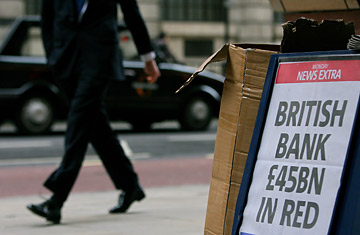
A newspaper headline on a billboard refers to a record annual loss by the Royal Bank of Scotland in London
Last October, when British Prime Minister Gordon Brown and his Finance Minister, Alistair Darling, unveiled their emergency intervention to recapitalize U.K. banks, they did so in front of a capacity crowd in the oak-paneled suite of rooms at 10 Downing Street, which are used for the Prime Minister's press briefings. At this morning's sequel performance, when Brown and Darling presented their new emergency plan to try again to get banks lending, journalists were outnumbered by their hosts and attendant staff. In just a few months, the prospect of the government spending billions of pounds of taxpayers' money to shore up financial institutions and stimulate a drooping economy has gone from hot news to ho-hum.
That's partly because, as Brown himself pointed out, "almost every country in the world followed" where he led in the fall, introducing their own variants on the recapitalization scheme. But it's also because Britain is no longer in the vanguard in dealing with the crisis. Germany's recently unveiled stimulus package came later but is bigger than its British equivalent. The world is understandably much more interested in what President-elect Barack Obama's Administration will do than in what is being done in Britain today. (See pictures of the financial crisis in London.)
And yet as Brown and Darling gathered on Monday to unleash a slew of new schemes, the stakes for the Prime Minister — and the British economy as a whole — could scarcely have been higher. Central to those plans is the creation of a bumper insurance scheme that will permit banks to buy cover against losses on bad loans in the hopes that this will encourage banks to start lending to Britain's cash-strapped companies and consumers. Also announced: a $74 billion scheme allowing the Bank of England — Britain's lender of last resort — to buy high-quality assets directly from financial institutions as well as other companies. An existing $370 billion plan granting a government guarantee on bonds issued by banks, earmarked to close in April, was extended to the end of 2009. And Northern Rock, the mortgage bank crippled by the credit crisis and nationalized in 2008, will abandon plans to wind down its mortgage book, the government said, and instead boost funds available to home buyers. (Read "Four Steps to Ending the Foreclosure Crisis.")
Clearing access to credit for banks, firms and consumers is crucial. Interest rates may be at their lowest since the Bank of England was created more than 300 years ago, and the banking industry may have already received $55 billion in government money, but nervous British lenders are simply not lending enough. The result: British GDP will tumble 2.7% this year, Ernst & Young forecast on Monday, the biggest drop since 1946. "Without additional government intervention," it added, "a deep recession could evolve into a depression."
The government's insurance scheme will play a key role in efforts to prevent that. Under the plan, scheduled to run for at least five years, banks will pay a fee to the government for taking out a policy. Lenders will also shoulder a "first loss" amount — similar to the excess on an auto insurance policy — as well as roughly 10% of the remaining losses. In return for picking up the rest, the government will require banks to sign agreements binding them to increased rates of lending. Just how much risk that exposes the U.K. government to is unclear; the level of banks' exposure to the kind of toxic assets the insurance protects against is still blurry. And any pickup in the economy could reduce a lender's need to cash in any such policy. Still, "we need to offer this insurance," Darling insisted. "If we don't ... then frankly the lending will not start again, and we will have a much more serious situation."
In other words: further nationalizations. Three months after it pumped $30 billion in emergency capital into the beleaguered Royal Bank of Scotland, the government on Monday upped its stake in the bank to almost 70% in order to help boost its lending capability. The timing could hardly have been worse: the bank announced on Monday that its losses for 2008 could be as high as $41 billion — by some stretch the biggest loss in British corporate history. Much of that loss is due to RBS's ill-timed acquisition of Dutch lender ABN Amro in 2007. "Yes, I'm angry at RBS and what happened," Brown conceded. But, he added, "We have to recognize anger is not enough."
Whether Brown's policies offer better solutions remains to be seen. While there's little more it can do to boost domestic banks' lending, the government is still "doing everything on an ad hoc basis," reckons Simon Maughan, banking analyst at MF Global in London. "There is a serious risk that if Gordon Brown's poll rating falls, then he'll do something else, but it won't necessarily be constructive. We're going to have a recession, and at some point, you've just got to suck it and see."
